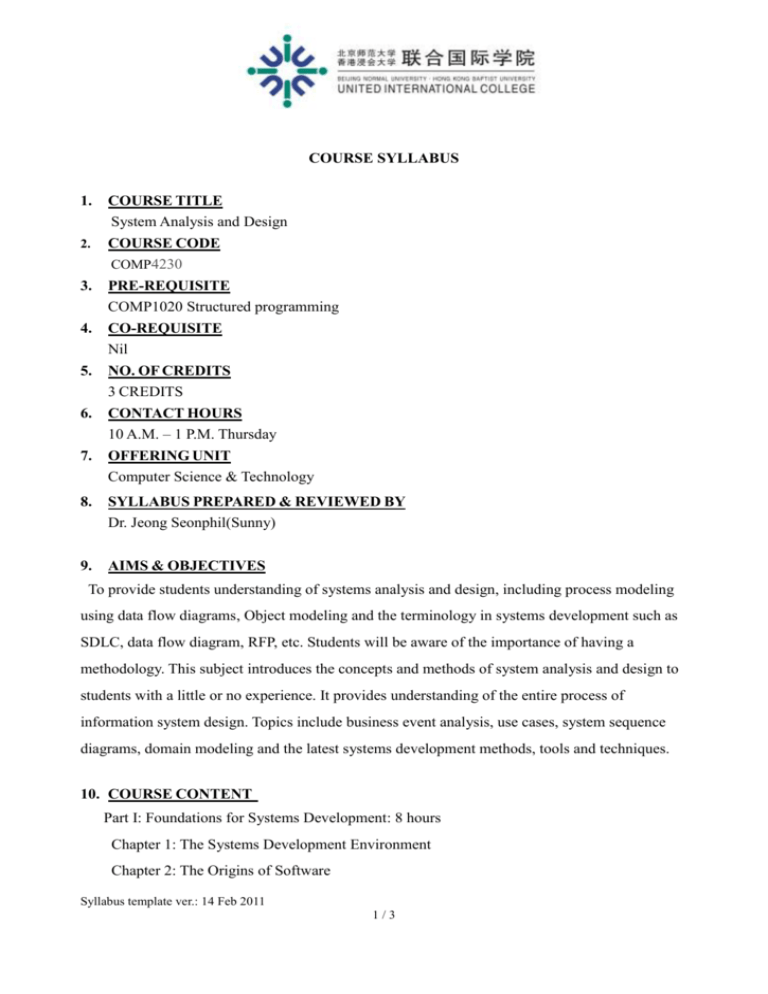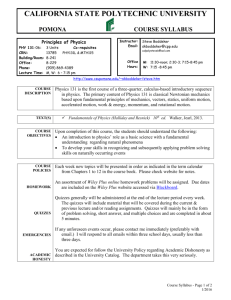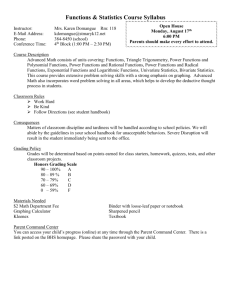
COURSE SYLLABUS
1.
COURSE TITLE
System Analysis and Design
2.
COURSE CODE
COMP4230
3.
PRE-REQUISITE
COMP1020 Structured programming
4.
CO-REQUISITE
Nil
5.
NO. OF CREDITS
3 CREDITS
6.
CONTACT HOURS
10 A.M. – 1 P.M. Thursday
7.
OFFERING UNIT
Computer Science & Technology
8.
SYLLABUS PREPARED & REVIEWED BY
Dr. Jeong Seonphil(Sunny)
9.
AIMS & OBJECTIVES
To provide students understanding of systems analysis and design, including process modeling
using data flow diagrams, Object modeling and the terminology in systems development such as
SDLC, data flow diagram, RFP, etc. Students will be aware of the importance of having a
methodology. This subject introduces the concepts and methods of system analysis and design to
students with a little or no experience. It provides understanding of the entire process of
information system design. Topics include business event analysis, use cases, system sequence
diagrams, domain modeling and the latest systems development methods, tools and techniques.
10. COURSE CONTENT
Part I: Foundations for Systems Development: 8 hours
Chapter 1: The Systems Development Environment
Chapter 2: The Origins of Software
Syllabus template ver.: 14 Feb 2011
1/3
Chapter 3: Managing the Information Systems Project
Part II: Planning: 8 hours
Chapter 4: Identifying and Selecting Systems Development Projects
Chapter 5: Initiating and Planning Systems Development Projects
Part III: Analysis: 8 hours
Chapter 6: Determining System Requirements
Chapter 7: Structuring System Process Requirements
Chapter 8: Structuring System Data Requirements
Part IV: Design 6 hours
Chapter 9: Designing Databases
Chapter 10: Designing Forms and Reports
Chapter 11: Designing Interfaces and Dialogues
Chapter 12: Designing Distributed and Internet Systems
Part V: Implementation and Maintenance: 4 hours
Chapter 13: System Implementation
Chapter 14: Maintaining Information Systems
Part VI : Team project and presentation :
6 hours
11. COURSE INTENDED LEARNING OUTCOMES (CILOS)
By the end of the semester, successful students will be able to
describe different lifecycle models and explain the importance and contribution of the systems
understand many approaches to systems analysis and design and explain their strengths and
weaknesses.
evaluate the tools and techniques of systems analysis and design.
be aware of the importance of having a methodology.
have comprehensive Knowledge of project management finally.
12. TEACHING & LEARNING ACTIVITIES (TLAS)
Students must read the teaching material before coming to the class. The teaching material is
Syllabus template ver.: 14 Feb 2011
2/3
consisting of PT files, animations and movie clips. The instructor also will keep updating
teaching material periodically and will post them on the course website. Relevant extra-material
will be provided in class.
The instructor will explain theories first and the student will have practical experience at the end
of each chapter. Two assignments and several quizzes will be provided. All the students will have
chances to discuss their results of the quizzes and assignments individually. Finally, student will
have a team project for applying their knowledge to a real company site as a case- study.
13. ASSESSMENT METHODS (AMS)
(1) Quizzes/Assignments : 10%
These quizzes will test students’ understanding of basic concepts and theories of each chapter.
(2) Mid-term examination: 10%
This examination will test the students’ knowledge about SDLC focus on basic concept of
system analysis.
(3) Project and presentation: 30%
This project will enhance the students’ ability to apply their knowledge to the real IS project
and encourage them to solve the problem with methodologies.
(4) Final examination: 50%
This examination will evaluate students’ knowledge of SDLC and test how to design
information systems for an organization.
14. TEXTBOOKS / RECOMMENDED READINGS
Jeffrey A. Hoffer “Modern Systems Analysis and Design"(5th E). Pearson Prentice Hall. 2008.
Bentley . Whitten “System Analysis & Design for the Global Enterprise”(7th E)
Mcgraw Hill 2009.
Jeffrey Whitten and Lonnie Bentley, Introduction to Systems Analysis And Design, 1st edition,
McGraw-Hill/Irwin, 2006
Jeffrey O. Grady System Requirements Analysis
1st edition, Academic Press, 2006.
Selected articles from journals and Magazines
Last revised: <17 Mar. 2011 >
Syllabus template ver.: 14 Feb 2011
3/3








